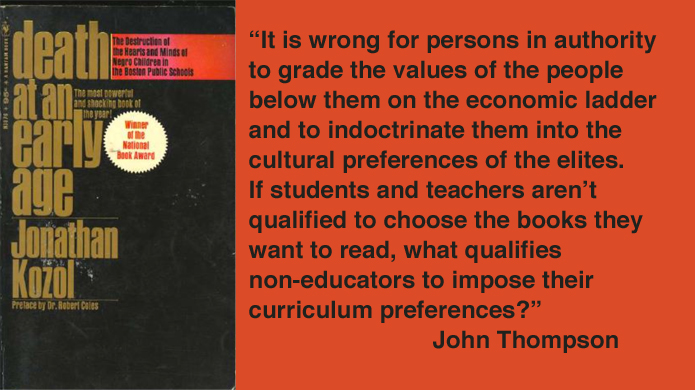Jonathan Kozol's Death at an Early Age Is Still a Must-Read

Rereading Jonathan Kozol's Death at an Early Age on the 50th anniversary of his firing from the Boston Public School System is to be forced to confront the unrelenting horror of school segregation. Its subtitle is The Destruction of the Hearts and Minds of Negro Children in the Boston Public Schools.
We first meet Kozol's 4th grade student, Stephen, who talks to himself and stares "with unusual concentration at a chosen spot on the floor." Stephen is beaten in his foster home, and ridiculed and subjected to corporal punishment at school.
Before long, we read about Frederick who is hospitalized after suffering an injury when he moved his hand as he was punished. The teachers who do the beatings might, in all other instances, seem to be decent persons, but the way they make a fetish out of inflicting pain on children seems inexplicable. When a mistake is made and a child is injured, the perpetrator forcefully protests that he "done the whipping right." But, as Kozol explains:
When you hear of a sixty pound mentally ill fourth grader being guarded by two men and whipped by a third for acts that are manifestly crazy, and when the teacher who prepares the punishment is not only gleaming with excitement but has, not ten days before, been speaking of the niggers Down South or the little bastards causing trouble up there in room four, then ... something has gone wrong.
Teachers didn't seem to notice when an emotionally disturbed child walked backwards up the stairs or made frog noises as he hopped like a frog. It was easier to dismiss such children as impossible to teach, and resort to physical punishment. Even the Reading Teacher, who appeared to be one of the better of the educators, reacted cruelly to a student who cried when he fell behind in reading. She told the struggling student, "'I'll not have it.'" When doing so, the Reading Teacher was "virtually seething with her decision-making power."
Teachers didn't seem to notice when an emotionally disturbed child walked backwards up the stairs or made frog noises as he hopped like a frog. It was easier to dismiss such children as impossible to teach, and resort to physical punishment. Even the Reading Teacher, who appeared to be one of the better of the educators, reacted cruelly to a student who cried when he fell behind in reading. She told the struggling student, "'I'll not have it.'" When doing so, the Reading Teacher was "virtually seething with her decision-making power."
Neither did the teachers notice the "bright and attractive and impatient Negro girl who showed her hatred for school and teacher by sitting all day with a slow and smoldering look of cynical resentment." Only Kozol, it seemed, appreciated the creative insubordination of the boy who was asked the antonym of dry and replied "isn't there something called a dry martini?"
The faculty seemed united in its condemnation of Kozol's building of personal relationships with students, giving kids gifts and driving them home after school, as Jonathan Kozol's Death at an Early Age Is Still a Must-Read | John Thompson:
